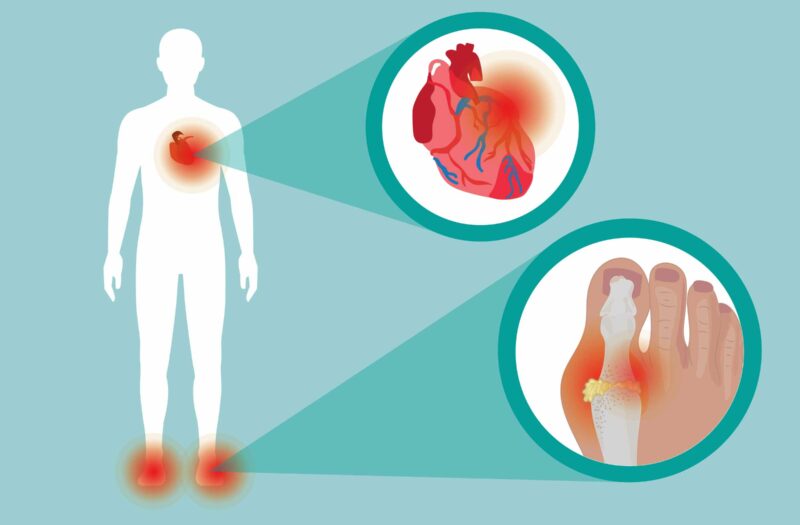Key Takeaways
- Gout patients who had a flare were significantly more likely than those who did not to suffer a serious cardiovascular event in the following 60 days.
- Some increased risk of heart attack and stroke might persist for as long as 120 days after a flare.
- Inflammation associated with gout may also contribute to blood vessel damage.
Many gout patients are at high risk for heart disease, because inflammation that underlies this disorder can also impact your heart and blood vessels. Co-existing conditions, like type 2 diabetes and obesity, are also common among people with gout — and these, in turn, also up the odds of having a heart attack or stroke.
Now new research finds that the danger might be especially grave in the months after a flare.
Gout is a type of chronic, inflammatory arthritis that occurs when uric acid — normally a waste product — builds up in the bloodstream and then crystalizes in joints such as the big toe. But it also associated with elevated levels of inflammation throughout the entire body.
The new study, which was published in JAMA, relied on data from more than 62,000 gout patients, some of whom had a serious cardiovascular event like a heart attack or stroke. The UK-based researcher team analyzed data from health records with an eye on determining whether there was a connection between gout flares and subsequent cardiovascular events.
For part of this study, more than 10,000 newly-diagnosed gout patients who had experienced a serious cardiovascular event were compared to more than 52,000 newly-diagnosed gout patients who did not have any significant cardiovascular trouble. After “matching” people in these groups so that they were similar in terms of age, sex, and time since their gout diagnosis, the researchers determined that those who had undergone a serious cardiovascular event were two percent more likely to have had a gout flair during the 60 days that proceeded it (versus 1.4 percent for those who did not have a cardiovascular event).
The chances of having had a flare were also somewhat higher during the 61 to 120 days leading up to a cardiovascular event (1.6 percent risk of flare versus 1.2 percent risk of flare for those without a cardiac event during the same time period).
While at first glance the difference in these numbers might not seem terribly high, the authors determined they were significant enough to be concerning. “These findings suggest gout flares are associated with a transient increase in cardiovascular events following the flare,” they concluded.
In an accompanying editorial, two U.S.-based physicians (who were not involved in conducting this study) said that the findings “should alert clinicians and patients to the increased cardiovascular risk in the weeks beginning after a gout flare and should focus attention on optimizing preventive measures. Patients should be alert to the signs and symptoms of unstable angina, [heart attack], and ischemic stroke so that medical care can be emergently sought.”
They also advised clinicians to “emphasize the importance of optimizing lifestyle measures and standard risk factor control, including adherence to diet, statins, anti-inflammatory drugs (e.g., aspirin, colchicine), smoking cessation, diabetic and blood pressure control, and [blood thinning] medications as indicated,” though they added that “the incremental risk [of a cardiovascular event] after a gout flare was small.”
This study does not prove that a gout flare directly causes a heart attack or stroke, but it suggests that a flare might raise the risk of such events. A spike in inflammation might lead to plaque in the arteries breaking off, which could lead to a stroke (if it blocks blood flow to the brain) or a heart attack (if it blocks blood flow to the heart). Gout-related inflammation might also cause irregular heartbeat.
What This Means for You
A gout flare might raise the risk of a subsequent heart attack or stroke, or signal that one is on the horizon. Working with your health care provider and taking steps to prevent gout flares might translate to protecting your ticker
Want to Get More Involved with Patient Advocacy?
The 50-State Network is the grassroots advocacy arm of CreakyJoints and the Global Healthy Living Foundation, comprised of patients with chronic illness who are trained as health care activists to proactively connect with local, state, and federal health policy stakeholders to share their perspectives and influence change. If you want to effect change and make health care more affordable and accessible to patients with chronic illness, learn more here.
Anderson J, et al. “Cardiovascular Events and Gout Flares.” JAMA 328. August 2, 2022. doi: https://doi.org/10.1001/jama.2022.9165.
Cipolletta E, et al. “Association Between Gout Flare and Subsequent Cardiovascular Events Among Patients With Gout.” JAMA. August 2, 2022. doi: https://doi.org/10.1001/jama.2022.11390.






